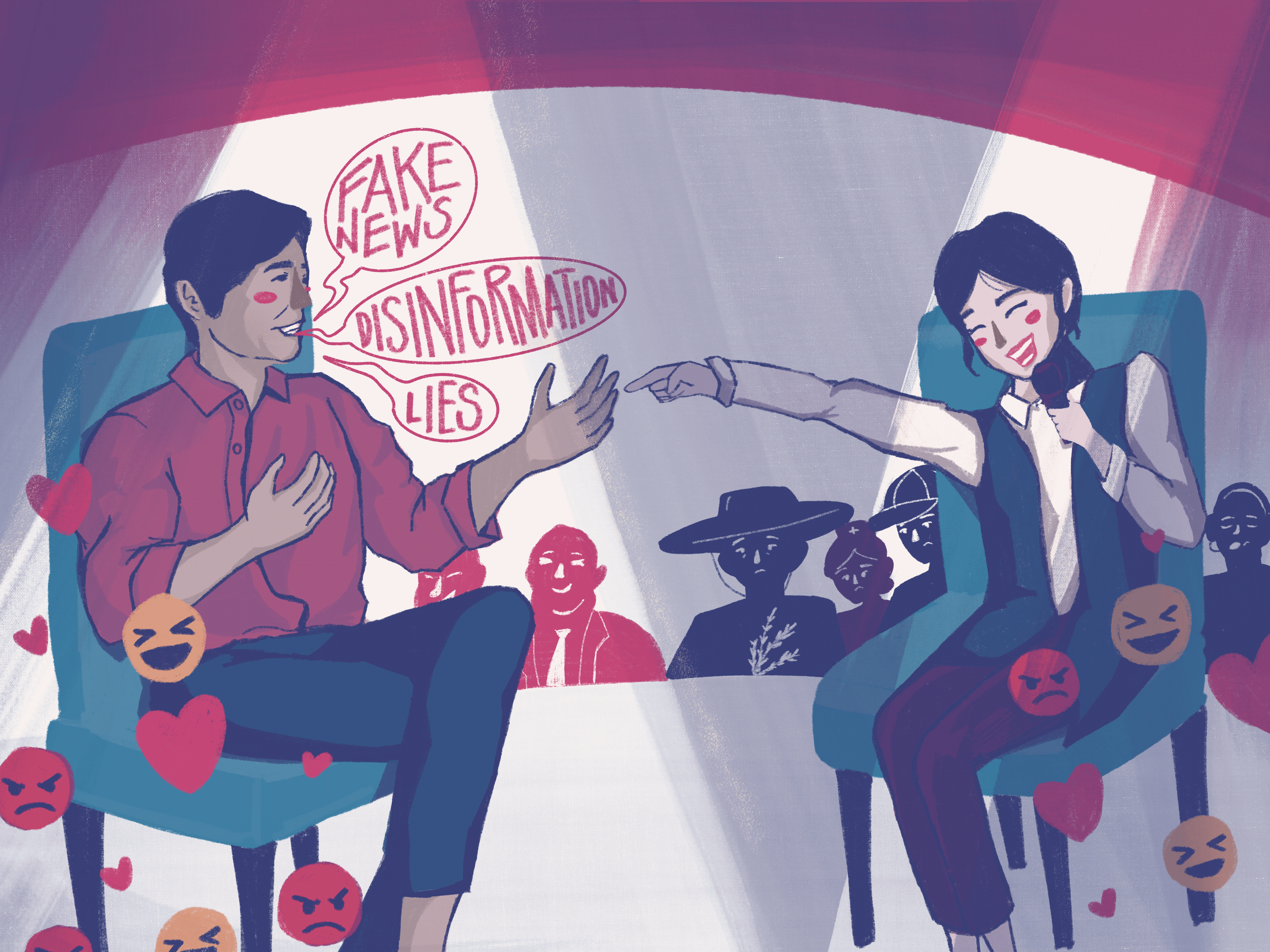JOURNALISM IS an essential bastion of information dissemination during any country’s elections. Media companies and organizations are often expected to conduct coverage of electoral processes and candidates. Subsequently, these outlets can be criticized regarding the extent and delivery of their news.
As the nation geared up for Halalan 2022, the Philippines witnessed a discernible shift in its media landscape—particularly in the celebritization of political reportage.
Celebritization refers to the mobility that notable personalities feel they have when it comes to navigating the spheres of media and entertainment. Commonly, this is exhibited in how showbiz figures might suddenly vie for a political position, which is a common occurrence in the Philippines.
Aside from seeking a government post, celebrities have also opted to foray into “journalism.” Consequently, it has become increasingly crucial to assert the importance of responsible reportage of political affairs, as well as the vigilant consumption of media.
Selling out
Toni Gonzaga’s Toni Talks series received flak for its overall lack of teeth, especially in her video with the late dictator’s son, Ferdinand Marcos Jr. In refusing to dispute his false claims, Gonzaga—under the guise of impartiality—granted Marcos Jr. the platform to sway the public opinion in his favor.
Gonzaga is more popularly known as an actress and host who ventured into producing YouTube vlogs three years ago. With over five million people subscribed to her channel as of writing, her glorified coffee dates with the presidentiables have only contributed to the rampancy of local disinformation campaigns.
Allowing celebrities to get away with this has led even larger media corporations to do the same. Such is the case of the Sonshine Media Network International (SMNI) Presidential debate, which various local journalists slammed for perpetuating propaganda regarding bets who declined to attend.
SMNI has been widely criticized for fuelling disinformation, red-tagging activists and critics, and making misleading—if not entirely false—claims. Owned by pastor and US-indicted sex trafficker Apollo Quiboloy, SMNI has even been flagged by Facebook as a sharer of posts that violates the site’s Community Standards. And yet the network has continued to exponentially expand its social media influence while still receiving traction for its biased reportage.
Edge of your seat
One might be wondering: Who benefits from these avenues of duplicity and misrepresentation? The answer lies in the politicos who suddenly become singers and dancers come campaign season.
Those who engage in personality politics thrive in the celebritized version of journalism because not much is demanded of them beyond sheer entertainment value. Manila City Mayor Francisco “Isko” Moreno and Senator Emmanuel “Manny” Pacquiao play this game well, dominating both alternative and mainstream media by sheer virtue of employing so-called “pogi” politics.
As an ex-actor and famed boxer respectively, Moreno and Pacquiao understand the value of pandering to the voting population. Pacquiao relies heavily on the concept of name recall that has positioned him as a “people’s champ” worth rooting for within and beyond the ring. Moreno, on the other hand, banks more on the shock factor that can be elicited from radicality—which can be witnessed from the controversial press conference where he called on survey runner-up Vice President Leonor “Leni” Robredo to withdraw.
For as long as entertainment can command the attention of Filipinos, then celebrities will only continue to venture into the political realm whether as shiny candidates or masquerading reporters.
The fat lady’s song
In overcoming the dangerous precedent set by the entertainment factor of politics, one must begin with the very media institutions and personalities that perpetuate the phenomena.
media institutions and personalities that perpetuate the phenomena.
Political reportage is not a field that can be entered on a whim. Pre- and post-campaign coverage must affirm the pledge that journalists often take; that is, to be accountable to the public, center integrity, and challenge falsehoods as they arise. Philippine politics is not meant to be tabloid fodder. It should be treated with utmost responsibility and sensibility in lieu of its encompassing effects on society.
Likewise, media consumers must become more discerning. Research has pointed out that Filipinos fall behind in inquisitiveness, instead passively believing in whatever information is available to them. Remedying the ills of celebritized journalism demands that Filipinos criticize the bearers of news, fact-check information as necessary, and support journalists and institutions who are ethical emissaries.
One day, it may become possible to dim the dazzle of star-power when it comes to Filipino politics if journalists and everyday citizens work hand in hand to combat inadequacy. After all, the ballot that decides who rises to power is more than a popularity poll. It is a decision cemented in stone, influenced heavily by all those who intentionally shared which side of history they chose to stand on.







